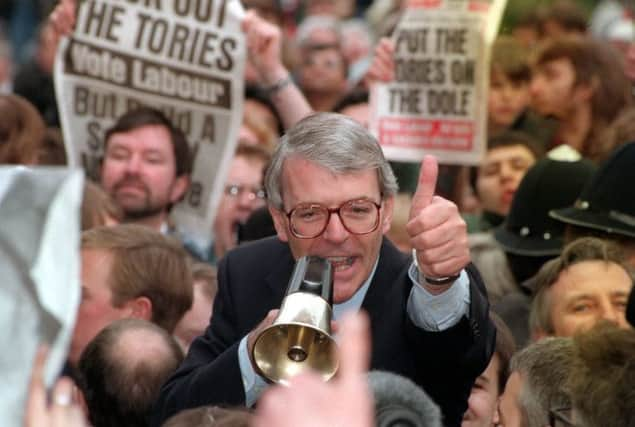Andrew Whitaker: General Election has echoes of 1992


That result had far-reaching consequences for both Labour and the Tories, even though the outcome that saw a narrow Tory majority cannot be compared to, say, the Blair landslide of 1997 or the Thatcher victory in 1979.
Both parties have lived with the effects of the 1992 General Election, which invokes memories of an overly emotional Neil Kinnock temporarily losing control at Labour’s Sheffield rally and John Major facing hecklers on his soapbox. Despite Tony Blair’s three election wins in a row, Labour has to a large extent remained haunted by the loss of the 1992 election, a contest that many expected it to win at the height of the early 1990s recession and after more than a decade of Tory rule with unpopular policies such as the Poll Tax.
Advertisement
Hide AdAdvertisement
Hide AdEd Miliband and other senior party figures, such as election campaign boss Douglas Alexander, are all too keenly aware of the parallels between the elections of 1992 and 2015, with Labour holding narrow leads in opinion polls over a Tory party whose ministers are often viewed as being out of touch.
For many in Labour – particularly those of the Miliband and Alexander generation – the thought that voters preferred the “grey” Mr Major to their own party in 1992 is still something that burns away at their psyche. Certainly that defeat was to lead to Labour continuing its rightwards shift begun under Mr Kinnock, with many senior figures suggesting the party would have to accept the changes introduced by the Tories if it was ever to win again.
Mr Miliband will be all too aware of the way Mr Kinnock was targeted as Labour’s perceived weakness back in 1992, and will be expecting similar personalised attacks on himself. But he will also know that a Labour win next year – particularly by the first leader of the party not to move rightwards in more than 20 years – could finally lay the ghost of 1992 to rest.
The Tories have their own ghosts from 1992, not least because that year was the last time the party – once such an awesome election winning machine – won an overall Commons majority. Certainly after the Tory victory in 1992, Mr Major’s government appeared to lurch from crisis to crisis, including sleaze allegations, and never really recovered from winning what was a fourth consecutive election victory.
Mr Cameron’s failure to win outright in 2010, despite having nearly five years as opposition leader against unpopular Labour prime ministers in Tony Blair and Gordon Brown, suggests the Tories too have yet to fully recover from the effects of the 1992 election.